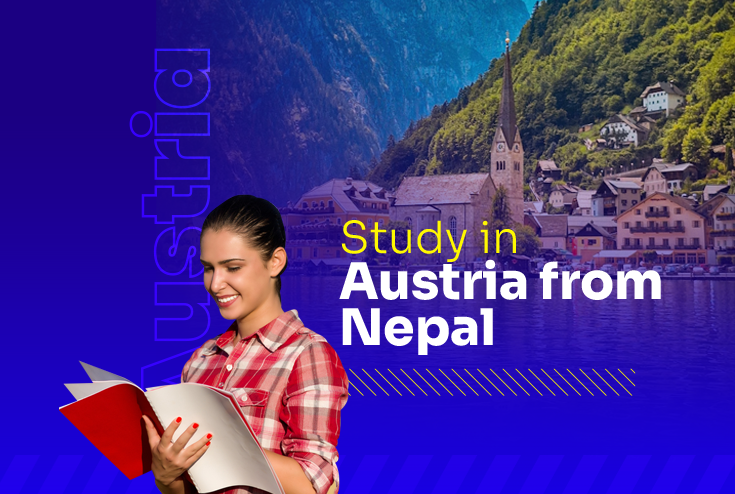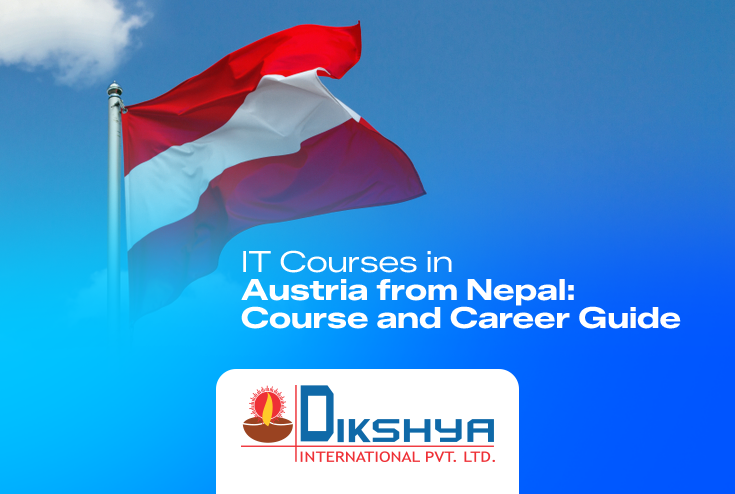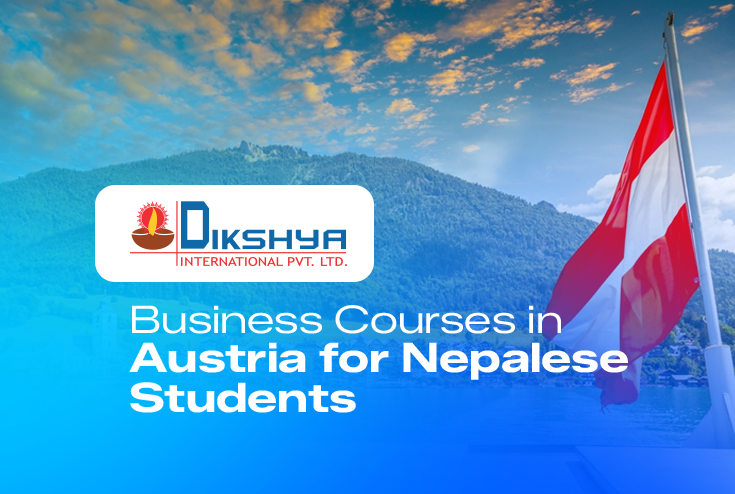
Study in Austria from Nepal: Complete Guide 2025
Dreaming of studying abroad without breaking the bank? For Nepalese students, Austria has become a hotspot for high-quality, affordable education.
In the 2023 academic year, Austria hosted approximately 400,340 students, marking a 1.8% increase from the previous year. Notably, around 20% of these students were international, highlighting Austria's growing appeal among global learners.
With over 200 programs offered in English in a range of fields from engineering and business to arts and life sciences, numerous scholarships upto 100%, and a pathway to permanent residency, Austria stands out as a top choice for higher education in Europe.
Table of Contents
- Austrian Education System for Higher Studies
- Eligibility & Requirements to Study in Austria from Nepal
- Total Cost & Tuition Fees
- Top Universities to Study in Austria
- Best Courses to Study in Austria
- Scholarships in Austria for Nepalese Students
- Intakes and Application Deadlines
- How to Get a Student Visa for Austria from Nepal
- Work While Studying in Austria
- Study in Austria with Dependent (Spouse & Family)
- Pathways to Permanent Residency (PR) in Austria
- Key Takeaways
- Choosing the Right Consultancy for Austrian Studies
- FAQs on Studying in Austria from Nepal
Austrian Education System for Higher Studies
Austria’s higher education system is highly regarded for its balance of quality, affordability, and research opportunities. Universities here are classified into three main types:
Types of Universities in Austria
|
Type |
Focus |
Tuition (Approx.) |
Ideal For |
|
Public Universities |
Research & theory |
€1,200–€1,500/year |
Academic-focused students |
|
Private Universities |
Specialized programs |
€10,000–€20,000/year |
Niche disciplines |
|
Universities of Applied Sciences (Fachhochschule) |
Practical training & internships |
€1,500–€4,000/year |
Career-oriented students |
Degree Levels
- Bachelor’s: 3–4 years, taught in German or English
- Master’s: 1–2 years, research or professional-oriented
- PhD: 3–5 years, focused on research and innovation
Key Features
- Strong research infrastructure with international collaborations
- Opportunities for part-time work and internships
- Affordable education compared to Western Europe
Austria offers a mix of traditional and applied learning programs suitable for Nepalese students seeking affordable yet globally recognized degrees.
Eligibility & Requirements to Study in Austria from Nepal
Nepalese students must meet certain academic and language requirements to study in Austria. The basic requirements include:
Academic Requirements
- Bachelor’s Programs: Completion of +2/12th grade or equivalent
- Master’s Programs: Recognized Bachelor’s degree
- Minimum GPA: 2.5–3.0 on a 4.0 scale (varies by university)
Language Requirements
- English-taught programs: IELTS 6.0–6.5 or TOEFL equivalent
- German-taught programs: German language certificate (A2/B1)
Other Documents
- Passport copy
- Motivation letter
- Letters of recommendation
- CV/Resume
- Proof of financial resources
Meeting these requirements increases your chances for admission, scholarships, and smooth visa approval.
Total Cost & Tuition Fees
Studying in Austria is significantly more affordable than in other Western European countries, making it attractive for Nepalese students. The tuition fees for public universities generally range from €1,200–€1,500 per year for international students, while private universities and specialized programs may cost more.
Tuition Fees
- Public universities: €1,200–€1,500 per year for international students.
- Private universities: €10,000–€20,000 per year, depending on program and specialization.
- Universities of Applied Sciences (Fachhochschulen): €1,500–€4,000 per year.
Living Expenses (per month)
|
Expense |
Average Cost (EUR) |
Notes |
|
Accommodation |
450 |
Student dormitories or private rentals |
|
Food & Groceries |
350 |
Depends on lifestyle |
|
Health Insurance |
50–100 |
Mandatory for all students |
|
Transport & Miscellaneous |
400 |
Public transport, leisure, books |
Estimated Annual Budget
Overall, a Nepalese student can plan for an annual budget of €8,000–€12,000, making Austria one of the most affordable countries for higher studies in Europe.
Scholarships and part-time work can further reduce costs, making Austria a viable option for budget-conscious students.
Top Universities to Study in Austria
Austria is home to several globally recognized universities that attract international students. Some of the top options include:
|
University |
Popular Programs |
Scholarships / Notes |
|
University of Vienna |
Sciences, Humanities, Business |
University scholarships & Erasmus+ options |
|
Graz University of Technology |
Engineering, IT |
Research assistant opportunities |
|
University of Innsbruck |
Natural Sciences, Social Sciences |
Student exchange programs |
|
Vienna University of Economics & Business |
Business, Economics, Finance |
Merit-based scholarships |
|
Johannes Kepler University Linz |
Technology, Business, Law |
Internship-linked learning programs |
These universities offer not only academic excellence but also opportunities for scholarships and research grants, making them ideal for Nepalese students seeking affordable yet quality education.
Best Courses to Study in Austria
Austria offers a wide range of study programs, but some fields are especially popular among international and Nepalese students because of their global demand and scholarship availability.
Top Courses:
- Engineering & Technology – Strong programs in mechanical, civil, and electrical engineering.
- Computer Science & IT – Artificial intelligence, data science, and software engineering.
- Business & Management – International business, finance, and economics.
- Tourism & Hospitality – Austria’s global reputation in hospitality management.
- Medical & Life Sciences – Research-driven fields in medicine, biology, and public health.
- Arts & Humanities – Music, philosophy, fine arts, and cultural studies.
Tip: Choosing courses aligned with Austria’s research strengths (engineering, sciences, music, and arts) often increases scholarship opportunities.
Scholarships in Austria for Nepalese Students
Studying in Austria can be remarkably affordable compared to other European destinations, especially when scholarships are factored in. For Nepalese students, scholarships not only cover tuition fees but often provide living allowances, travel grants, and insurance support. Here are the major opportunities:
1. Austrian Government Scholarships
- OeAD Scholarships (Austrian Agency for International Cooperation in Education and Research): These are highly competitive scholarships open to international students, including Nepalese. They cover partial or full tuition fees, monthly stipends (around €1,050), and insurance.
- Ernst Mach Grant: Specifically designed for students from non-EU countries, this grant supports master’s and PhD candidates in technical and scientific fields.
2. University-Specific Scholarships
Almost all the universities in Austria provide attractive scholarships and funding aids to international students. Check the scholarship pages on the official website of your shortlisted universities. Some popular examples include:
- University of Vienna Scholarships: Provides merit-based and need-based financial aid. Students with outstanding academic records can apply for tuition fee reductions or stipends.
- Vienna University of Technology (TU Wien): Offers scholarships in engineering, computer science, and mathematics for high-achieving students.
- WU Vienna University of Economics and Business: Provides financial support for international students, particularly those pursuing business analytics, finance, or economics.
3. Erasmus+ Scholarships
If you enroll in a joint master’s program in Austria under Erasmus Mundus, you can benefit from fully funded scholarships that cover tuition, travel, installation, and a monthly living allowance.
4. Private and Organizational Scholarships
- Richard Plaschka Grant for doctoral candidates in humanities.
- Helmut Veith Stipend for women in computer science.
- Industry-Specific Grants from Austrian companies in technology, energy, and healthcare.
Many universities in Austria already have low or no tuition fees for international students, making scholarships an added advantage rather than a necessity.
Some Nepalese students have received up to 100% scholarships, especially at public universities, making Austria an affordable choice.
Intakes and Application Deadlines
Austrian universities typically follow a two-semester intake system:
|
Intake |
Semester Start |
Application Deadline |
|
Winter Semester |
October |
March–July |
|
Summer Semester |
March |
September–February |
Key Notes for Nepalese Students:
- Start applications at least 6–9 months in advance.
- Scholarship deadlines are often earlier than regular admissions.
- Required documents (like bank balance proof, IELTS, and transcripts) must be prepared ahead of time.
Applying early gives you a higher chance of securing scholarships and preferred courses.
How to Get a Student Visa for Austria from Nepal
To study in Austria, Nepalese students need a Student Residence Permit (Aufenthaltsbewilligung – Student). This permit allows them to stay in Austria for the duration of their studies.
Visa Application Steps:
- Secure Admission: Obtain an official admission letter from an Austrian university.
- Prepare Documents: Required papers include:
- Valid passport
- Admission/acceptance letter
- Proof of sufficient funds (approx. EUR 11,000 per year)
- Proof of accommodation in Austria
- Health insurance coverage
- Academic transcripts and certificates
- Passport-size photographs
- Submit Application: Apply at the Embassy of Austria in New Delhi, India, since Austria does not have a consulate in Nepal.
- Attend Interview: A short interview may be conducted during the visa process. Stay prepared with the commonly asked question, and be clear about all your documents.
- Processing Time: Usually takes 2–3 months, so applying well in advance is crucial.
Austria Student Visa Fees (2025):
- Application Fee: ~EUR 120
- Residence Permit Card Fee: ~EUR 20
Pro Tip: Students are advised to maintain a clear financial record and ensure that all documents are legalized and translated if necessary. Incomplete documentation is the most common reason for visa rejections.
Other Key Points:
- Spouse/Dependent Visa: Students can apply for family reunification, allowing spouses to stay during study.
- Success Rate: With complete documentation and financial proof, the Austria student visa success rate for Nepalese applicants is considered high.
Application Timeline for Nepalese Students
|
Time Before Intake |
Action |
|
12 months |
Research universities, courses, and scholarships. |
|
9 months |
Prepare documents (transcripts, Statement of Purpose (SOP), recommendation letters, proof of funds). |
|
6–8 months |
Submit applications and await admission letters. |
|
3–4 months |
Apply for an Austrian student visa. |
|
1 month |
Arrange accommodation and travel. |
Pro Tip: Austrian universities are very strict about deadlines. Late applications are usually not entertained unless there's a rolling admission policy.
Work While Studying in Austria
Austria allows international students to work part-time while studying, which helps cover living expenses.
Work Regulations
- Bachelor & Master students: Up to 20 hours per week during semester.
- Full-time during semester breaks.Students usually work in hospitality, retail, research assistant roles, or internships related to their field of study.
Tip: For Nepalese students, having basic German language skills greatly increases job opportunities and employability.
Earning Potential in Austria for International Students
There’s no minimum wage in Austria as of Jan, 2025. However, part-time jobs commonly pay around €10–€15 per hour.
This sums up to your monthly earnings of around €800–€1200 with 20 hours per week limitation.
This income can cover a significant portion of living costs (approx. €400–€600).
Part-time work not only helps financially but also builds valuable European work experience.
Note: While part-time work can cover living expenses, it should not be considered as the main source of funding because proof of sufficient finances is mandatory before visa approval.
Study in Austria with Dependent (Spouse & Family)
Austria allows international students to bring their dependents under the Family Reunification Visa. This includes a spouse and minor children.
- The student must prove financial capacity to support dependents. (Approx. €1,600–2,000 per month is required for a couple.)
- Dependents are eligible to apply for a Residence Permit – Family Member, which allows them to stay for the duration of the student’s program.
- Spouses may also gain limited work rights depending on their permit conditions.
For Nepalese families, it is crucial to plan financial documentation carefully, as the Austrian embassy checks for genuine relationship proof, adequate housing, and sufficient bank balance before granting dependent visas.
Pathways to Permanent Residency (PR) in Austria
Austria offers clear pathways for international students who wish to settle after their studies.
Steps Toward PR:
- Job-Seeking Visa
After graduation, students can apply for a 6-month job-seeking visa to find employment relevant to their degree. This visa is solely for your job hunting period. Once you find a job that matches your qualifications, switch to Red-White-Red-Card immediately.
- Red-White-Red Card
Once employed, graduates can apply for this work and residence permit, valid for 2 years. If you had already secured a high-qualifying job during your study duration, you can directly apply for this permit.
- EU Blue Card
For high-skilled graduates with a job offer above a certain salary threshold (€45,595 gross per year in 2025), the EU Blue Card provides a faster route to long-term residency.
- Renewal & Long-Term Residency
After residing in Austria continuously for at least 5 years legally (this period includes time spent on student visa and relevant work/residence permits), students can apply for Permanent Residency, known as Daueraufenthalt – EU.
Requirements for PR include financial self-sufficiency, health insurance coverage, and integration criteria such as achieving B1 level German language proficiency.
Why PR in Austria is Attractive
Permanent Residency allows for long-term residence and stable access to employment and social benefits in Austria.
- Access to European job markets.
- High quality of life and social security benefits.
- Potential path to Austrian citizenship after 10 years of residence.
For Nepalese students, Austria is one of the most affordable countries in Europe to study, live, work, and eventually settle with handsome future prospects.
Key Takeaways
- Austria offers affordable or tuition-free education at top-ranked universities, especially in public institutions.
- Students must show proof of funds (€11,000+ per year) for visa approval, even if tuition is low.
- German language skills are highly beneficial for part-time jobs, career growth, and long-term settlement.
- Dependents (spouse/children) can join students in Austria under the Family Reunification Visa.
- Graduates can transition to work permits like the Red-White-Red Card or EU Blue Card, leading to Permanent Residency after 5 years.
- Choosing the right consultancy in Nepal makes the process smoother, from university selection to visa success.
Choosing the Right Consultancy for Austrian Studies
The process of applying to Austrian universities, securing scholarships, and navigating visa requirements can be confusing and overwhelming. A professional consultancy helps simplify every step. They have the years of knowledge, and have seen both success and pitfalls of students application – the experience you’ll need the most.
How a consultancy helps:
- Guidance on choosing the right university and course.
- Preparation for language tests (IELTS, German).
- Assistance with application forms, SOPs, and recommendation letters.
- Visa documentation support.
- Pre-departure counseling and accommodation guidance.
Many Nepalese students rely on consultancies like Dikshya International, which specializes in Austria, providing end-to-end support in test preparation, admissions, and visa applications. With expert guidance, your chances of admission and scholarships increase significantly.
Begin your journey today by exploring Austria’s best courses and universities, and take the first step toward your academic and professional future in Europe. Contact Us Today!
FAQs on Studying in Austria from Nepal
How much does it cost to study in Austria from Nepal?
Tuition at public universities is around €1,200–€1,500/year, while annual living costs range from €8,000–€12,000. Besides, you will also need a compulsory health insurance of around €73.48/month in 2025.
How much GPA is required to study in Austria from Nepal?
Most universities require a minimum GPA of 2.5–3.0 on a 4.0 scale, depending on the program.
Is studying in Austria free?
It’s not fully free, but tuition fees are very low compared to most European countries. Some scholarships cover 100% of costs.
Can I study in Austria with IELTS?
Yes, many English-taught programs require IELTS (6.0–6.5) or TOEFL. German-taught courses require A2/B1 German language proficiency.
Is the Austria student visa easy to get?
Yes, if you provide complete documents and financial proof, the visa success rate is pretty high, even for Nepalese students.
How much bank balance is required for Austria student visa?
Students must show around €11,000/year in a blocked account. That’s the average cost you need for the first year of living in Austria.
Is there an Embassy of Austria in Nepal?
Currently, Nepalese applicants must apply through the Austrian Embassy in New Delhi since there is no embassy of Austria in Nepal.
Are students allowed to work in Austria?
Yes, up to 20 hours per week during semesters and full-time during breaks.
What is the cost of living in Austria?
Living costs average €700–€1,000 per month, depending on the city.





Get Guidance